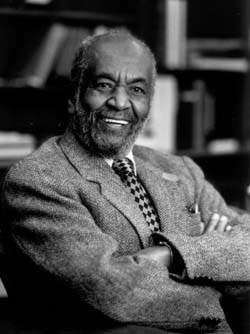Gordon Ends Tenure as Interim Dean with Address to Faculty
At the last faculty meeting of the academic year, Edmund W. Gordon, Richard March Hoe Professor of Psychology and Education, Emeritus and Interim Dean, delivered his final official remarks to the academic community.
"I probably have pushed too aggressively on some fronts, and have been perceived, by some, to have threatened the borders of the prerogatives reserved for faculty decision. I apologize if I have been offensive, but I do not apologize for having tried to stimulate change."
And what were some of the issues that the Interim Dean tried to identify over the academic year- those he felt should inform academic content, policy, and program decisions?
Gordon spoke about how Teachers College "may be trying to do too many things, and in the balkanization of our programs there may be too much redundancy. If I were continuing as your Dean, I would push even harder for a comprehensive review of all of our programs, trying to determine: the quality of all that we do; the relationship of all to the mission of the college; where there are unnecessary duplications; and what should be done that we are not doing. I have argued that the integrity of Teachers College may well rest on the goodness with which we complete such a review, as does any real effort at rational budget planning."
He added, "I have probably not said enough about faculty assumption of greater responsibility for improving our fiscal situation. I have argued that our first line of attack should flow from the comprehensive review of our programs and their possible redesign to better reflect a match between our capacity and public need. Our existing programs may not be sufficiently sensitive to the changing educational needs of the society."
Gordon also pointed to "understanding the nature of the study of the disciplines in the preparation of professional and academic workers." He remarked, "I have argued that both should be scholarly, but have tried to focus attention on the possible differences between preparation for scholarly practice and the production of knowledge. I have suggested that we may be privileging the application of the disciplines to the neglect of the integrity of the disciplines. I argue that the fact that we are both a graduate school and a professional school requires that we honor both of these disciplines with greater symmetry."
Gordon referred to his deep concern for pedagogy. That pedagogy-teaching and learning-should be at the core of the TC mission. "Understandings of the history and the nature of pedagogy should inform all that we do...But our concern for pedagogy must not be too abstract. Given the mission of the College, which includes attention to the diversity of the urban community in which we reside, I have proposed that our making pedagogy central to all that we do be done in addressing what I call the most critical problems facing education in our nation. That problem is the challenge...to uncouple academic achievement from social divisions in which students happen to fall-class, ethnicity, gender and first language."
While applauding the College's increased concern for technology, he maintained that he has "insisted that in addition to exploiting the implications of that medium of communications, we should also be exploring the dialectical implications of technology and pedagogy for the potential of each to influence the other." He added, "We must ask the questions, 'How can pedagogical knowledge better inform what we do with technology?' And 'What are the implications of the intersect between education and electronic technology for our better understanding of teaching and learning?' ...The field is crowded with those who would exploit technology. At Teachers College we must seek to understand technology in the context of our principal concern for the advancement of pedagogy."
He closed with a nod to his colleagues and a heartfelt thank you. "I assure you that I have been guided in my actions by my great love for Teachers College as an institution, and by my deep respect for the intellectual integrity of its faculty. Thank you very much for permitting me to serve as your Interim Dean."
Published Tuesday, Sep. 18, 2001
